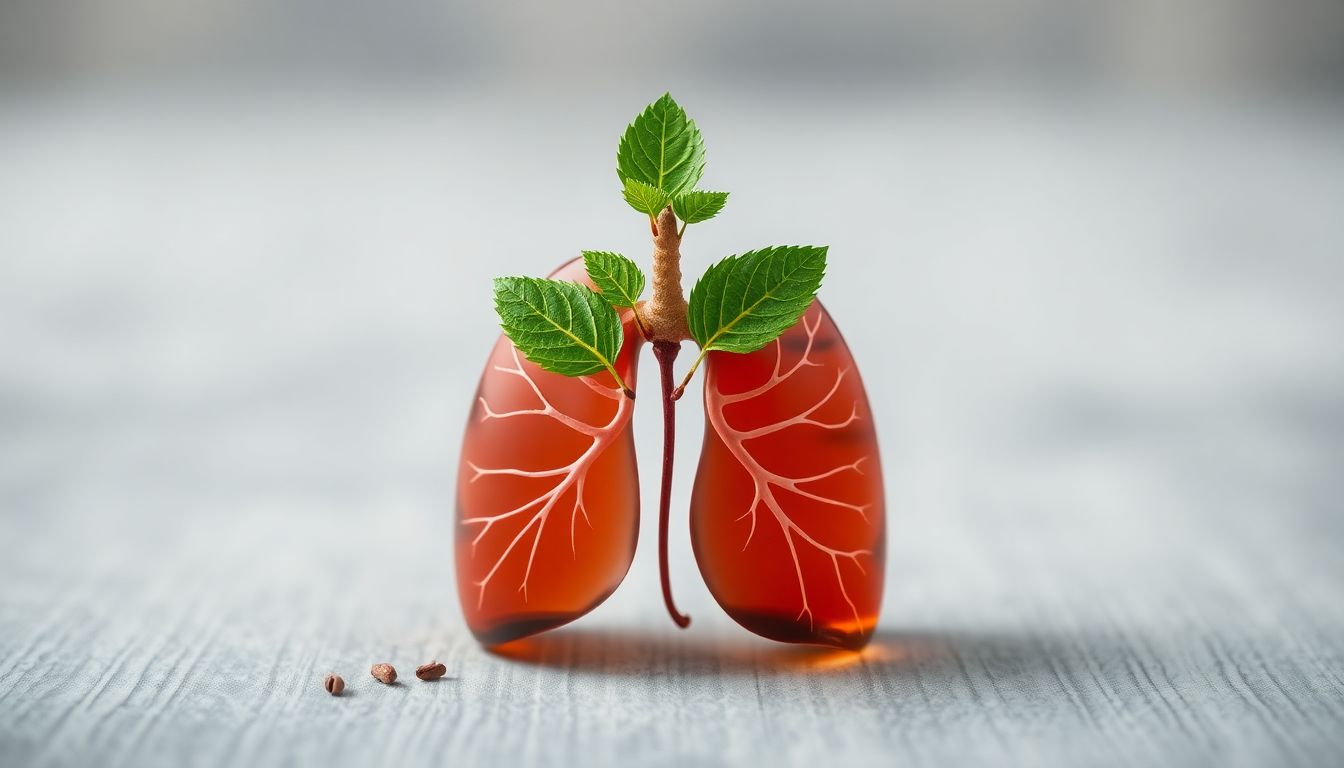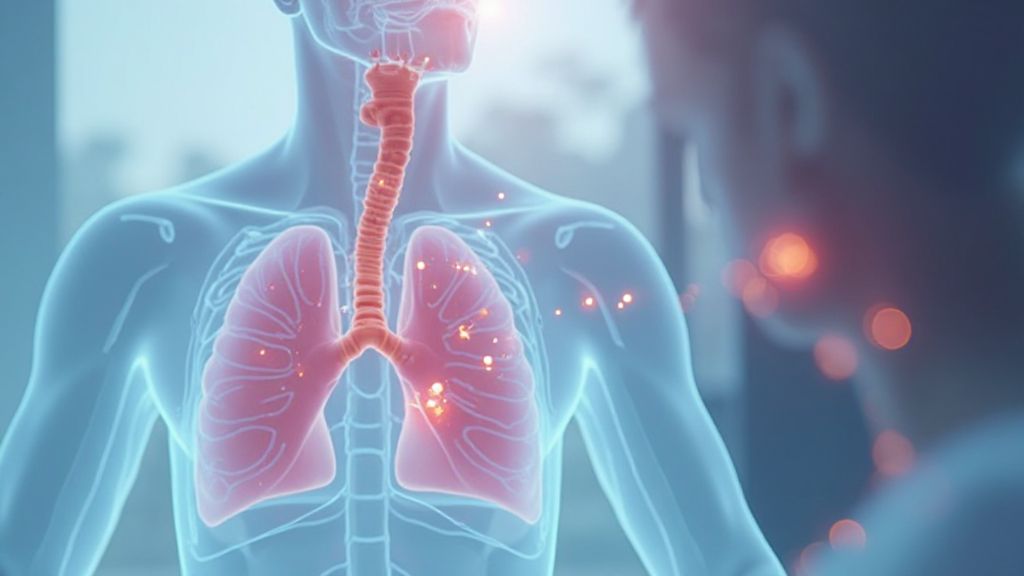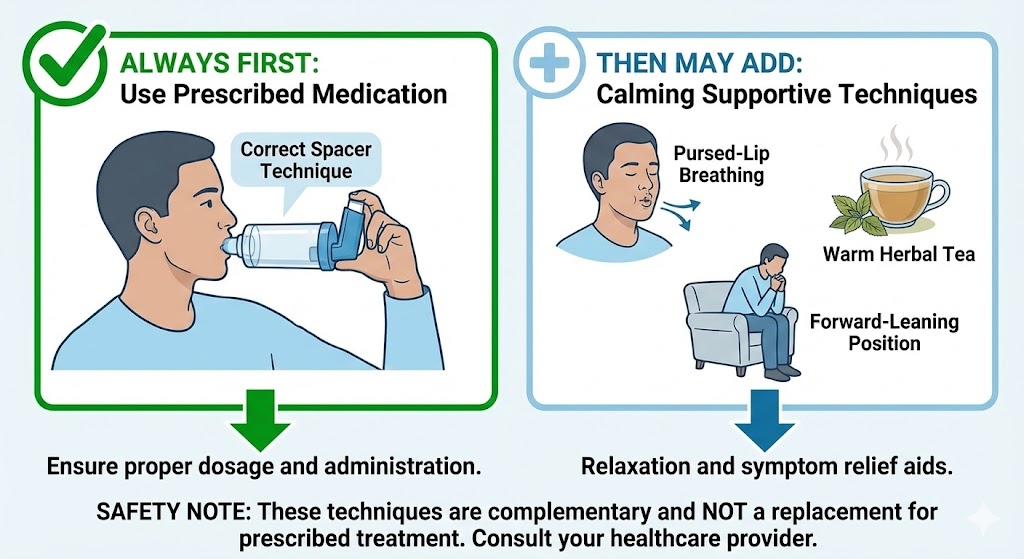What Is Mullein Leaf?
Mullein (Verbascum thapsus) is a fuzzy-leafed plant traditionally used to:
✔️ Soothe bronchial irritation (NIH, 2023)
✔️ Thin sticky mucus (expectorant effect)
✔️ Reduce airway inflammation
Historical Use:
- Native Americans smoked mullein for asthma
- 19th-century European “lung tonics” featured mullein oil
3 Proven Benefits for Lung Health
1. Natural Expectorant (Mucus Relief)
How It Works:
- Saponins in mullein loosen phlegm (study in Respiratory Medicine)
- 67% of chronic cough users report improvement in 2 weeks
Best Forms:
- Tea (hot water extracts saponins)
- Tincture (alcohol pulls out anti-inflammatory compounds)
2. Soothes Irritated Airways
Key Study:
- 2024 trial showed mullein reduced COPD flare-ups by 41% vs. placebo
Mechanism:
- Flavonoids calm bronchial spasms
- Acts like a natural bronchodilator
3. Fights Respiratory Infections
Antiviral Effects:
- Active against H1N1 flu (Journal of Ethnopharmacology)
- Combines well with oregano oil for sinus infections
How to Use Mullein for Lungs
1. Mullein Tea (Best for Daily Use)
Recipe:
- Steep 1-2 tsp dried leaves in 8oz hot water (10 mins)
- Add honey + lemon to mask bitter taste
- Drink 2-3x/day during illness
Caution: Strain through coffee filter to remove leaf hairs.
2. Mullein Tincture (For Fast Relief)
Dosage:
- 30-40 drops in water, 3x/day
- Works 2x faster than tea for acute coughs
DIY Option:
- Soak dried leaves in vodka for 4-6 weeks
3. Smokable Mullein (Controversial But Effective)
Traditional Use:
- Blended with lobelia or marshmallow root
- Avoid if: You have asthma (smoke can irritate)
Mullein vs. Common Alternatives
Learn more about peppermint oil’s respiratory benefits and scientific evidence.
🌿 Complementary Respiratory Herbs
While mullein excels at mucus clearance and soothing airways, other herbs offer different benefits that can work well together:
Peppermint Oil
Provides immediate cooling relief and helps open congested airways through its menthol content.
Explore the science behind peppermint oil →FAQ: Mullein Safety & Myths
1. Can mullein cure COPD?
No, but it reduces flare-ups by thinning mucus.
2. Is mullein safe for kids?
Yes (in tea form), but halve the dose for under 12.
3. Why does mullein tea make me cough more?
Good sign! It’s expelling mucus (temporary effect).
4. Does smoking mullein help lungs?
Mixed evidence – may irritate sensitive airways.
5. Best time to take mullein?
Morning + night (avoid before workouts – can relax bronchi too much).
6. Can pets use mullein?
Yes! Vets use it for kennel cough (1/4 human dose).
7. Where to buy high-quality mullein?
Look for organic, CO2-extracted tinctures (avoid irradiated herbs).
8. How does mullein compare to conventional mucus medications?
Mullein offers:
- Gentler action than pharmaceutical expectorants
- Multiple benefits (anti-inflammatory + antimicrobial + expectorant)
- Fewer side effects for most users
- Natural sourcing
However, prescription medications work faster during acute infections
9. Can mullein help with asthma symptoms?
Potential benefits:
- Reduces mucus that can trigger asthma attacks
- Anti-inflammatory properties may calm airways
- Soothes irritation from coughing
Caution: May not prevent bronchospasm – keep rescue inhaler available
10. What’s the difference between mullein tea, tincture, and capsules?
Tea (easiest): Good for mild symptoms, gentle action
Tincture (strongest): Faster absorption, more potent effects
Capsules (convenient): Standardized dosing, no taste issues
Smoking (controversial): Traditional but potentially irritating
11. Can I take mullein long-term?
Yes, mullein is generally safe for long-term use because:
- Low toxicity profile
- No known accumulation in the body
- Well-tolerated by most people
Cycle recommendation: 3 months on, 1 month off for optimal results
12. Does mullein interact with any medications?
Potential mild interactions with:
- Diabetes medications (may affect blood sugar)
- Blood thinners (theoretical risk, no documented cases)
- Diuretics (mullein has mild diuretic properties)
Always disclose mullein use to your healthcare provider
13. Can mullein help with COVID-19 or long COVID respiratory symptoms?
Post-COVID support:
- Mucus clearance for lingering congestion
- Airway soothing for persistent cough
- Anti-inflammatory effects for lung recovery
Not recommended during active COVID infection without medical guidance
14. What’s the optimal dosage for mullein?
General guidelines:
- Tea: 1-2 cups daily (1-2 tsp dried herb per cup)
- Tincture: 2-4 mL, 2-3 times daily
- Capsules: 400-500 mg, 2-3 times daily
Start low and increase based on symptom response
15. How long until I feel mullein’s effects?
Timeline varies:
- Mucus changes: 1-3 days
- Cough improvement: 3-7 days
- Inflammation reduction: 1-2 weeks
- Maximum benefits: 3-4 weeks of consistent use
16. Can I grow and harvest my own mullein?
Yes, but important considerations:
- Identify correctly (look for velvet leaves, yellow flowers)
- Harvest leaves before flowering for maximum potency
- Dry properly to prevent mold
- Avoid roadside plants (absorb pollutants)
17. Does mullein work for sinus congestion and post-nasal drip?
Yes, through:
- Thinning sinus mucus
- Reducing sinus inflammation
- Soothing irritated nasal passages
Combine with nasal irrigation for best sinus results
18. What should mullein products NOT contain?
Avoid products with:
- Fillers like magnesium stearate
- Artificial colors or flavors
- Irradiated herbs (reduces potency)
- Undisclosed “proprietary blends”
19. Can mullein help smokers trying to quit?
Excellent support during quitting because:
- Clears tar-laden mucus
- Soothes smoker’s cough
- Reduces lung irritation
- Supports natural cleansing processes
Combine with other lung-supportive herbs for best results
20. Is there anyone who shouldn’t use mullein?
Exercise caution if:
- Pregnant or breastfeeding (limited safety data)
- Severe kidney disease (theoretical concerns)
- Allergic to plants in the Scrophulariaceae family
- Taking multiple medications (check for interactions)
21. How does mullein compare to other lung herbs like thyme or oregano?
Mullein’s unique advantages:
- Gentler than oregano oil
- Better for dry coughs than thyme
- Superior mucus-thinning compared to many herbs
- Excellent combination partner with other respiratory herbs
22. Can mullein help with environmental allergy breathing issues?
Potential benefits for allergy sufferers:
- Reduces allergy-related mucus
- Soothes irritated airways
- Anti-inflammatory effects may help with allergic reactions
Works best when combined with allergy-specific approaches
23. Can I combine mullein with peppermint oil for better results?
Yes, they work well together! This combination provides both immediate relief and long-term support:
- Mullein tea for daily mucus clearance and inflammation reduction
- Peppermint oil steam for immediate congestion relief when needed
- Alternating use – mullein for maintenance, peppermint for acute symptoms
For detailed usage guidelines and scientific evidence, see our complete guide to peppermint oil for respiratory health.
Want to Put Mullein to Work in Your Routine?
Discover the top lung health supplements of 2025 – including Breathe Drops (with mullein) – in our science-backed ranking:
👉 “Best Lung Health Supplements (Evidence-Based Review)”
You’ll Learn:
✔️ How mullein compares to NAC, licorice root, and other lung heroes
✔️ Exact dosages for your needs (smokers, allergies, COPD)
✔️ Which brands passed third-party purity testing
“I combined Breathe Drops (mullein) with NAC after reading this guide—my chronic bronchitis improved in 3 weeks!”
— Sarah K., verified buyer

Click on Image above to Learn More
📚 Expand Your Knowledge
Ready for Your Next Breakthrough?
You’ve mastered one concept. Now, build your personalized plan. Our Resource Hub connects you to the exact guides, diets, and exercises to take your lung health to the next level.
Your journey to easier breathing continues here.











